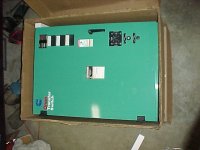First, and I could be all wet here, I think your load calculations are all wrong, unless you have a total electric house with a couple heat pumps and electric stove & water heater included. I say this because I run 2 houses and 3 barns off a 7.5kva Onan. Both houses are heated with oil fired boilers, and have wells, and I have power to spare.
Calculated load charts are wonderful things, for generator salesmen, not buyers. I've run an amprobe on my house, recording variety, and was surprized my peak load was only 5 amps under normal operation. Again, I'm not looking at your house, and have no idea what you are planning to run.
My second recommendation would be to put the generator inside the barn, not outside. It's a lot nicer to work on a machine inside a barn, and you usually have to work on them in the worst possible weather.
Either a 300 or 500 gal propane tank will power the unit, but given your climate, you need co consider vaporization rates if you want to use a generator that isn't running off liquid propane. A liquid fueled machine would normally be a water cooled engine with the coolant vaporizing the propane ahead of the carb. When you set up a standby generator, you always plan for worst possible conditions, cause that's usually when it will be needed. Since you mention a record low temp of -28, I'll point out that you culd unscrew a propane valve from a tank at that temperature and pour the liquid out on the ground, and watch it lay there and soak in. You can't burn propane in liquid form.
By your description, it appears you are building a new house, so you'll probably have excellent thermal insulation, and minimal heat loss. Loss of frozen foods and food in the fridge isn't enough of a consideration to justify an auto transferr system either. Most people are amazed when they learn how long a freezer of refridgerator stay cold with no power, as long as somebody isn't constantly opening and closing the door.
Also, since you mention Central Ohio, I'll give you a major bigtime warning, DO NOT deal with Level Propane. They are the biggest crooks in the world of Propane, so bad they've been thrown out of most propane associations.
As far as Propane goes, you'll also be much better off buying your own tank. Most vendors will compete to sell you a tank, and once you own it, you can buy propane much cheaper.
Another thing you need to consider is running time. Any stationary engine should be calculated at 20 hours equaling 1000 miles, so you need to change oil every 40 hours maximum on water cooled machines, or every 10 hours on air cooled machines cause the oil is a major cooling factor in air cooled machines. There are plenty of people who will tell you this isn't a necessary consideration. Most of them sell replacement generators and parts, or rebuild machines.
Another important consideration is the exercize cycle. The machine should exercize under load, not just running idle.
Finally, given your expected use, and duration, you definitely want a lo speed machine, not a 3600 Rpm model. Hi speed machines wear out much faster than lo speed machines.
I'd suggest you need to recalculate the loads, consider moving the machine into the barn, or garage of the house, and look at quality machines that run at either 1200 or 1800 rpm. A side benefit to having the machine in a barn would be free heat for the barn when the generator is running, unless you're talking about a really small barn, then you'd need to accomodate ventilation.

